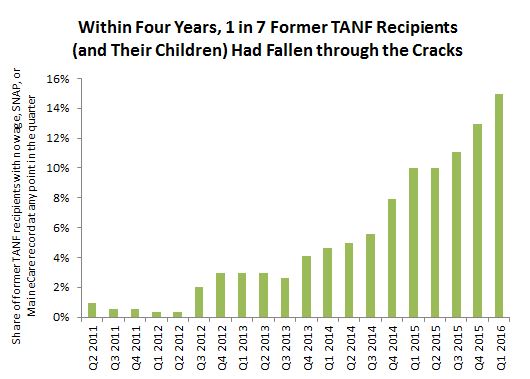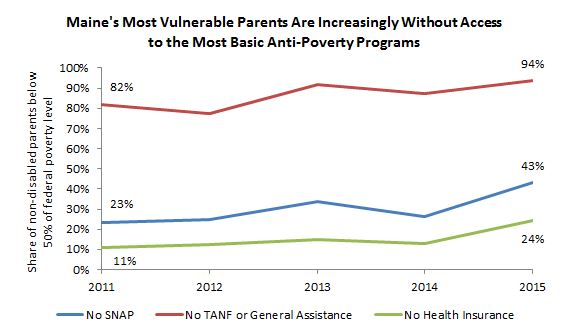Destitute and driven deeper into poverty. That’s the result of the LePage administration’s policies for one in seven families removed from the state’s welfare program in 2012. Instead of providing a path forward to help families put food on the table, oil in the furnace, and retain stable, good paying jobs, the administration’s policies have had the opposite effect for many families.
In their zeal to cut access to health care, food assistance, and temporary cash assistance, Governor LePage and former Health and Human Services Director Mary Mayhew appear to have lost sight of the primary purpose of these programs — to help struggling families lift themselves out of poverty. In fact, a review of the administration’s efforts to cut benefits conducted by the governor’s Office of Policy and Management (OPM) reveals that applying punitive restrictions, or completely eliminating access to crucial anti-poverty programs is ineffective and dangerous.
As part of its review, OPM examined the state records of 541 individuals who had received temporary cash assistance through the state’s welfare program (TANF) and had a wage record in the state’s unemployment insurance (UI) system between July 2011 and April 2012. This wage record means that these individuals worked at some point in the given time period while receipt of TANF means that they did not earn enough or maintain stable employment long enough to move out of poverty. During the same time period, according to OPM’s data nearly every parent in this group had also received food assistance through the Supplemental Nutrition Assistance program (SNAP) and obtained health coverage for themselves and/or a child through the state’s low-income health insurance program commonly known as MaineCare.
In May 2012, the state eliminated temporary cash assistance for these 541 individuals and their families. By the first quarter of 2016, at least one in seven of these families had no wage record (i.e., they were not employed at all in that quarter) and no record of having received food assistance or access to affordable health care through MaineCare. In other words, these families were left destitute.

Source: Maine Office of Policy and Management. Data for the 541 former TANF recipients with a record in the state unemployment insurance system at some point between Q2 2011 through Q1 2012. OPM did not release comparable information for any of the other former TANF recipients, nor for the share of working former TANF recipients who lost MaineCare or SNAP benefits.
The governor’s office contends that a lack of state records may indicate that these individuals had moved out of state. But other data show this is an unlikely explanation. Census data show that of those people who left Maine for other states between 2011 and 2015 (i.e. the same time period as the OPM study), just 3% had any public assistance income in the same year that they moved. Even fewer (2%) of those who moved out of state were single mothers with children – the primary TANF population.
A more likely reason for the increasing share of this population without any income or safety net resources is the LePage administration’s punitive policy changes to safety net programs. Between 2013 and 2014, the administration imposed new asset tests on SNAP recipients, “strongly encouraged” recipients to add a photo ID to their benefits cards, and placed harsher restrictions on the use of these cards. The administration’s restrictive new eligibility requirements for parents drastically reduced their MaineCare participation. Even though these changes did not affect the eligibility of most zero-income parents, they likely discouraged many from applying for benefits.
Census Bureau data for Maine residents show that the number of people left behind by LePage administration policies extends beyond the former TANF recipients in the OPM report. For non-disabled parents in deep poverty (below 50% of the federal poverty level), the impact of LePage policies on access to these programs has been dramatic. The share of these families without any food stamps in the past year nearly doubled from 23% in 2011 to 43% in 2015; the share of extremely poor parents with no health insurance coverage at all (MaineCare or otherwise) more than doubled, from 11% to 24%.

Source: MECEP analysis of US Census Bureau Data, American Community Survey 2011-2015 1-year estimates. “Non disabled” parents are those who were not in receipt of Supplemental Security Income.
The implementation of the LePage/Mayhew assault on the poor coincides with an increase in deep child poverty and less access to affordable health care for low-income Maine families and children. Poverty – especially deep poverty – has a number of detrimental effects. It prevents children from achieving the educational potential, increases the risk of chronic health conditions, and places incredible stress on those facing it. Without basic supports like TANF, SNAP or MaineCare, it’s extremely difficult for Mainers to climb out of poverty.
Rather than provide pathways to opportunity, LePage administration policies are actually trapping people in poverty by closing off options, imposing new barriers, and plunging Maine families into indigence and destitution. These policies also place greater stress on community efforts and institutions like churches and local food banks that are trying to help people who have fallen on hard times.
These policies also come at a time when we should be doing everything we can to boost labor force participation in order to grow our economy. With an aging population and a death rate that exceeds our birth rate, we need everyone who can work to be able to work. Making it harder for families to afford child care, access health care, or put food on the table creates greater instability and undermines efforts to increase the number of healthy, well-trained workers ready to secure a good paying job.
The OPM report unwittingly pulls back the curtain ever so slightly on the failed policies of the LePage administration as it relates to helping struggling families lift themselves out of poverty. The LePage/Mayhew prescription is a failed one that hurts Maine families and Maine communities now and in the future.



